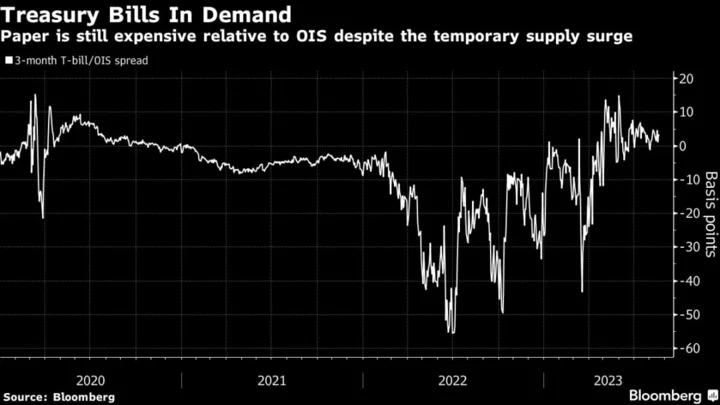The government has issued an eye-watering $1 trillion in Treasury bills since the debt-ceiling was suspended in early June. So far, the market hasn’t batted an eye.
For all the concerns about whether the market would be able to take up the supply, investors faced with uncertainty over the economy and the Federal Reserve’s policy path have piled into short-term debt, earning more than 5% yield to mop up the issuance.
Further evidence of a market awash in cash is the relative stability in the Fed’s overnight reverse repo facility. Despite the deluge of issuance, the difference between bill yields and so-called overnight index swaps, which investors use as a proxy for the Fed’s path, is hovering just above zero and discouraging investors from pulling cash out of the overnight facility (RRP). Money-market mutual funds — the largest buyers of T-bills and the primary RRP counterparties — continue to stash more than $1.8 trillion at the central bank, though that’s down from $2.16 trillion at the beginning of June.
“Supply seems to have been digested in orderly fashion as far as I can tell,” said Zachary Griffiths, senior fixed-income strategist at CreditSights. “We had been saying that the huge wave of bill supply wasn’t going to be a big issue for the market broadly because there is so much cash in the front end ready to be deployed if yields rose much more than ON RRP.”
Still, the question will be how easily market participants will digest the next wave of issuance, which JPMorgan Chase & Co. strategists estimated to be about $600 billion between now and the end of the calendar year. Money funds still have significant capacity to take on more Treasury bill supply, they said.
The weighted-average maturity of money-market funds is around 25 days and institutions tend to add duration when the Fed is getting close to cutting interest rates. There’s little evidence of a shift there. And with T-bills making up just 25% of government money fund portfolios at the end of July allocations remain low, there’s room to expand holdings and tap RRP funds where allocations are more than 30%, according to Crane data.
And, even if the additional bill issuance proves hard to digest later this year, the resulting in higher rates on bill yields will incentivize money funds to remove cash from the reverse repo facility where there’s still plenty of cash.

